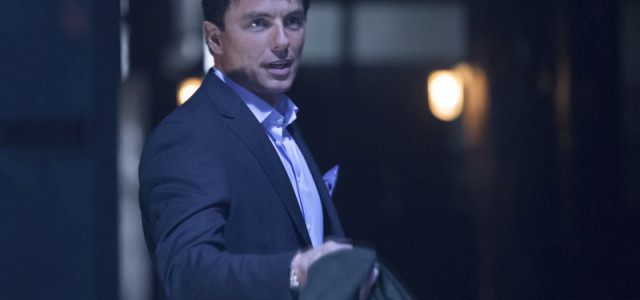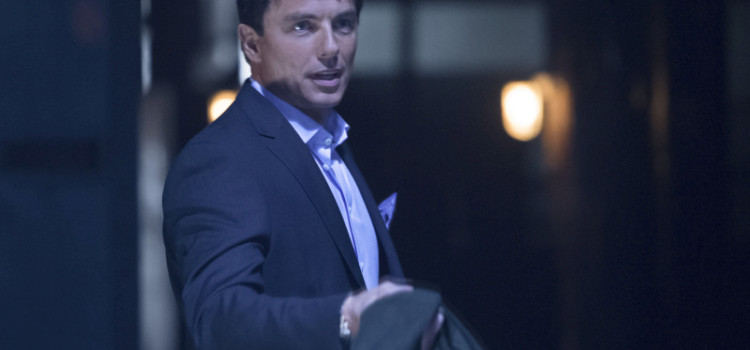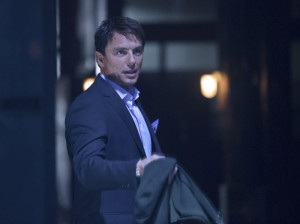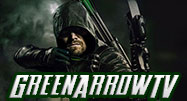

Arrow #1.23 “Sacrifice” Review (Derek’s View)
Recaps & Reviews May 21, 2013 Derek B. Gayle

 Both of GreenArrowTV’s reviewers are taking on last week’s Arrow season finale! You can read Matt Tucker’s review here.
Both of GreenArrowTV’s reviewers are taking on last week’s Arrow season finale! You can read Matt Tucker’s review here.
Summary: Arrow continues its upward slope of quality by spinning a beautiful, terrifying, pulse-pounding tale that brings all characters together and ends the season at its best and darkest point yet.
If you have not seen this episode yet and do not wish to be spoiled, do not continue reading!
Read an in-depth recap with trivia on our handy episode guide!
Review
It’s rare for a TV episode to feel exhausting. And not in the sense that it’s slow or long, just that it pulls so much out of the viewer that seeing the end credits is something of a catharsis. In the grand scope of TV, “Sacrifice” certainly isn’t the best episode of television ever produced, but it’s a suitable end for Arrow, and pulls out all the stops for the season’s final bow. And also, it’s really crazy non-stop intense.
The strength of this episode—and in retrospect, the show as a whole—is how much it completely sticks to its landings. Throughout it, we’ve had developments that could have easily been thrown out for the shock factor and then backtracked; how many times did Smallville have someone discover Clark’s secret only to find a way for them to forget it by the end of the episode? But when Oliver revealed his identity to Diggle, Felicity and Tommy, or Moira became entangled in the villain’s plot, or even when Oliver and Laurel started hooking up, they continued a natural progression leading up to something big, despite it uprooting the status quo. There have certainly been some hang-ups this season in its storytelling, like Tommy’s reaction to Oliver’s vigilantism being inconsistent, Oliver shrugging off Moira’s treachery until season’s end, or pretty much everything between Oliver and Laurel. But for the most part, anything established has remained an important element of the show. “Sacrifice” is exactly what we’d expect from a season finale—climactic action sequences, cliffhangers, big kisses and big deaths—but it’s not an empty collision of plot threads. It works because it successfully builds on what we’ve seen up until this point, with what at least seems to have been a clearly mapped-out plan from day one. And really, that “mapped-out plan” might be nothing more than the writers letting the characters evolve naturally, instead of simply inserting them into dramatic situations one right after another.
Arrow also sticks to its landing in another, more abstract way: it takes everything it does unabashedly seriously. While this was a hindrance in the oft-too-dark early episodes, increasing Diggle’s and Felicity’s relevance infused enough humor to keep things light even while serious. So we’re presented with these ridiculously, comic book-y storylines barely holding on to realism, but it’s done completely unironically. An easy fix to bringing superheroes to the screen is upping the camp or adding meta-commentary to distract from or make a joke out of the fantastical. But Arrow takes the more challenging route: presenting it all utterly straight, even in all its wackiness, a la The Dark Knight. It’s worth bringing it up here, because between the costumed archer battles and glowy-blue earthquake devices, “Sacrifice” is the most wacky, comic book-y episode yet. But the show ups the emotional stakes so high from the first minute, thanks to the season’s build-up, to the point where all of this feels excessively dangerous. It truly shines when the device goes off, and the haunting image of likely-populated buildings collapsing, coupled with Oliver’s absolute devastation at the failure and Felicity’s horrified tears, brings an unexpected pathos to the situation. This isn’t just some supervillian’s wild plot, this is a horrible destructive terrorist act that will kill a lot of people, and it’s legitimately scary.
“Sacrifice” throws out loads of death teases for literally every single character aside from Oliver himself. It’s another common season finale trope, but Arrow manages to wrap up the faux-foreshadowing with satisfying character moments and mini-arcs, even while tying back to the previous threads. Moira’s public confession could have led to a public shooting, but it also marks a change in the character by doing the right thing, and not using her family as an excuse to be silent. Thea’s “I love Roy!” moment is a little silly (and I chuckled a bit at Moira’s total confusion at who Roy even is) but it leads to a nice heroic moment for her, even if it’s based on naive teen love. Roy’s been on the fast-track for development lately, but this is easily the first time we’ve seen him actually display heroics without any ulterior motive. That he and Thea are both still teased “Speedys” in a sense, albeit in different ways, is pretty cool. Team Arrow worked together very well this episode, too, and Diggle and Felicity standing beside Oliver in the wake of disaster was a nice moment. While Diggle’s dialogue was pretty weak, like “You’ll be too dead,” or the awkward half-exposition joke about the tracker in Oliver’s boot, getting him in on the action is always a plus. And Emily Bett Rickards hit the right notes for Felicity during the climax, as she still pushed through even under the insurmountable pressure, but didn’t hold back the understandable fear. Her tearful reaction to the second device certainly hit the mark, and set the right tone for the episode’s solemn turn.
Quentin got the most blatant death tease of the episode, even coupled with a sappy little final speech (which is adeptly delivered by Blackthorne), but it’s his long-awaited character development that’s the best surprise of the episode. Not unlike his daughter, Quentin’s been something of a problem character, with plenty of shades of possible development without perfect delivery or execution. But even though Quentin’s arc might not have worked over the long run of the season, he’s shown enough sporadic bouts of heroism that his decision in this one is believable. Felicity’s speech about why she supports the Hood was a nice moment for her, but it was an even better moment for Quentin, and having the two play off of each other was an inspired move for the show. Rickards plays off of the “older” (i.e. not twentysomething) guys like Paul Blackthorne, David Ramsey and Colin Salmon very well, so now that she’s the not-so-secret liaison for team Arrow to Quentin, we ought to see more.
For the first time all season, there’s finally a justification for why the romance between Oliver and Laurel is important. Oliver notes that Laurel saw what he could be, before the island “scraped away” all the things he wasn’t rather than changing him, and she’s the only person who’s been consistent before and after. It’s an interesting way to present Oliver’s own journey, if a little flawed considering how much he’s already changed post-island. But it does finally establish why Oliver was always so intent to say Laurel “knew him” even when it seemed like she didn’t; he was referring to her seeing the good in him before the island, which is what he’s pursuing now. Cassidy and Amell still don’t have the chemistry they should, which may just be a problem that can never be solved, but at least the reasoning actually makes some sense. And even at that, the scene between the two in the mansion was incredibly well shot, with a very good score.
John Barrowman certainly hams it up in this hour, but like the show itself unabashedly taking everything seriously, he takes it and runs with it, too. Perhaps a less is more approach might have worked better for Malcolm, as Barrowman didn’t showcase much subtlety at all, but what we got still did the episode well. Malcolm is absolutely driven, so even though Barrowman’s angry “They deserve to die!” yelling was some scene-chewing, it’s used to showcase the fanaticism Malcolm’s beliefs have devolved into. Colin Donnell sells that scene well, too, with his visible fear as his world comes crashing down. It also does work to make Malcolm a downright scary character, as the moments when he is quiet, like when he apparently waits in his lair all geared up for Oliver, are effective.
Oliver’s final arc is a nice, one too. Amell’s acting in the teaser didn’t quite work for me, though he and the episode quite literally get better as they goes along from that point on. The idea that Oliver doesn’t know what he’s fighting for at first seems like a shoehorned-in lesson, but it does encapsulate a flaw in how he’s been performing. He’s made plenty of decisions to open up to people and gave importance to family, friends and love, but they’ve always been purposeful, tactical maneuvers. Even deciding to care more about Thea and his mother were more about keeping himself from going too far off the edge. It was never a pure, unbound motivation, but now he finally realizes how to use emotional connections as a strength without forcibly using them. It’s definitely a little vague and is essentially another “power of love” revelation, but it’s another case of the show taking it seriously enough that it works, and builds on Oliver’s heroic arc. I do wish Oliver’s revelation and the “defeat” of Malcolm had been a little bigger, but the fight scenes leading up to it were fantastic.
And of course, Colin Donnell goes out in a blaze of glory, in a sense. Tommy goes through a wide range of emotions throughout the episode, but there’s never a doubt at the end that he is, definitively, the truer hero of this season’s tale. He didn’t always make the best decisions, but he did truly become a better man just for the sake of his own goals. Axeing both Merlyns in the same episode is a daring move for the show—and certainly added to the surprise of Tommy’s demise—but it’s a smart one. The Green Goblin-esque storyline worked well for this season and teased some potentially interesting long term stories, but it would have been just that: another Osborn or Luthor story. As cool as those father/son villain stories are, Arrow‘s choice to spin Tommy as the ultimate hero is a much less traveled route to take, which can allow the show to further differentiate itself as it moves forward. Even if Malcolm makes a post-mortem return a la Deadshot, it wouldn’t necessarily be a bad thing.
The final scene is appropriately heartwrenching, of course, and Amell delivers his best performance at Tommy’s death. The main reason it works so well is because it’s so vastly different from any reaction we’ve seen from Oliver before. Amell’s choice to have Oliver deliver his lines with a childlike pleading is what drives in the knife. Green Arrow crying manly tears is one thing, but Amell’s Oliver is so monumentally devastated that he sheds all semblance of his hardened exterior in that moment and completely loses it. He’s simply a boy who’s just seen his best friend die, and while there’s an extra added layer of guilt with his “It should have been me,” it’s his pleas for Tommy to open his eyes that strike the perfect chord.
Those the final scenes—Tommy’s death and the final image of the Glade’s near-desolation—pack a wallop, and this episode ends on a high note because of it. The flaws are so scarce that they barely register, no doubt because the tension is so relentless. Arrow has become quite the thriller in its own right, but “Sacrifice” defied even itself. This is one of the most satisfying finales in quite a while, and one that’s just as pulse-pounding and breathtaking on rewatch as it was on first viewing. If anyone doubted Arrow in its early days (I know I certainly did) then this ought to alleviate the hesitation. It’s crazy, it’s emotional, it’s engaging, and it’s tense. It’s just plain great, and it’s exactly what we wanted.
Odds & Ends
- The island flashback this week featured the conclusion of the Fyers storyline. There wasn’t really much to it, other than Oliver’s big hero moment of taking out Fyers with an arrow. It didn’t feel like it took away from the story, necessarily, but it didn’t add much to it either.
- I took a gander at my review of the pilot, and it’s quite funny how many elements this show has smoothed out. Remember the awful voiceover? Or hearing “You have failed this city” played straight? Or the pre-Felicity lack of humor? “Sacrifice” is a wonderful example of just how far the show has come in one season.
- While Moira gets the big “failed this city” line of the week, the dark irony of Oliver himself being the one who fails the city in the end by not stopping The Undertaking is brilliant. Though, to be fair, he did stop one device—optimistically, that prevented a lot of damage, and was why it was contained to the East side, as Felicity says.
- Interestingly, Oliver wasn’t wearing his make-up throughout the episode’s climax. Considering there have been other cases when he’s put it on even with mere seconds to spare, that’s a bit of a logical slip-up. But I can’t say I mind this choice, considering how important Amell’s facial reactions in the back half of the episode are.
- I like the costume choice of putting Laurel in casual canary yellow and converse. We’ve seen her so often in business suits that she automatically seems more spry and energetic just by putting her in brighter, more youthful clothing.
- This is a super minor nitpick, but…where did Joanna come from?
- I don’t have the patience to count them myself, but I’m certainly curious how many times a derivative of “Sacrifice” is spoken.
- “Maybe after your Jihad we can grab some steaks.” I think that’s my favorite line of the show thus far.
Want to read another take? You can read Matt Tucker’s review here.
Derek B. Gayle
Derek B. Gayle is a Virginia native with a BS in English, Journalism and Film from Randolph-Macon College. In addition to being an avid Power Rangers and genre TV fanatic, he also currently co-produces, writes and performs in local theatre, and critically reviews old kids' cartoons. You can check out his portfolio here.
Arrow Reunion: Calamity Jane Now Available on Tubi
News Jun 17, 2024
Bid on a Piece of Arrow (and Flash) History!
News May 22, 2024
Arrow Season 8 Blu-ray & DVD Coming April 28
News Feb 5, 2020
End of an Arrow: Thoughts on the Series & Finale
News Jan 28, 2020















